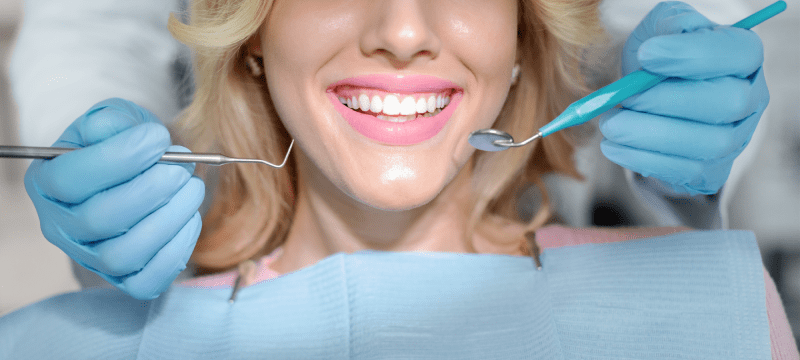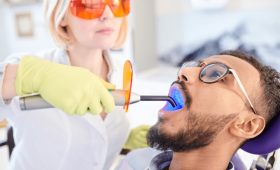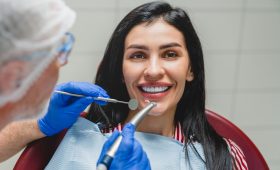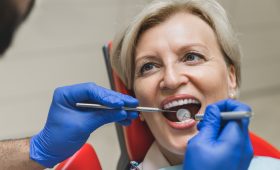What is Teeth Whitening?
Teeth whitening is a cosmetic dentistry procedure that aims to achieve a whiter and brighter smile by removing stains and discoloration that have accumulated on the surface of the teeth. This procedure is generally carried out using bleaching gels such as carbamide peroxide or hydrogen peroxide. Whitening works by penetrating the color pigments within the tooth’s internal structure, helping the tooth regain its natural whiteness. While the results vary depending on the person’s tooth structure and the whitening method, they generally produce a very successful and noticeable effect.
Why is Teeth Whitening Done?
Teeth whitening is an ideal solution for individuals who have experienced tooth discoloration for various reasons. It is quite common for teeth to yellow over time due to food and drinks (tea, coffee, red wine, etc.), smoking, or aging. Teeth whitening addresses these aesthetic concerns, enhancing a person’s smile and boosting their self-confidence. Due to its simple, fast, and effective nature, it is frequently chosen by those seeking smile aesthetics.
How Much Does Teeth Whitening Cost in Antalya?
The cost of teeth whitening in Antalya varies according to the method used, the quality of the clinic, and the dentist’s experience. Generally, prices offered are much more affordable compared to Western European countries. On average, the cost of an in-office (clinic) teeth whitening procedure can be around 85€. These prices are especially attractive to foreign patients due to the favorable exchange rate. It is important to contact your chosen clinic to get precise information about the prices.
Why are Teeth Whitening Prices in Antalya Affordable?
The main reasons for the affordable teeth whitening prices in Antalya are the advantageous exchange rate and the lower overall cost of living compared to Europe and North America. Additionally, in this region, where health tourism is well-developed, increasing competition among clinics and a high volume of patients allow them to lower their costs. Clinics that provide high-quality services pass this cost advantage directly on to patients, resulting in attractive prices. In this way, concepts that combine health and vacation, known as “cure holiday,” are also becoming popular.
What Teeth Whitening Methods are Available?
Teeth whitening is primarily done using two main methods: in-office (clinic) whitening and at-home whitening. In-office whitening is a procedure applied by a dentist in a clinic and is usually completed in a single session. The effect of the whitening gel is enhanced using a laser or special light sources. For at-home whitening, custom-made trays and low-concentration whitening gels prepared by the dentist are used. The patient wears these trays regularly at home. The two methods can also be used in combination.
What is In-Office (Clinic) Teeth Whitening?
In-office teeth whitening is the fastest and most effective method, performed under the supervision of a dentist in a clinic. In this method, the gums are protected with a special barrier, and a high-concentration whitening gel is applied to the teeth. Special light sources like lasers or LED lights are used to accelerate the whitening process. The procedure typically consists of three 15-20 minute sessions, lasting a total of about an hour. This method is ideal for those who want immediate and noticeable results.
What is At-Home Teeth Whitening?
At-home teeth whitening is a method you can apply yourself at home under the supervision of your dentist. During your first visit to the clinic, your dentist will take an impression of your mouth to create custom-made, clear whitening trays for you. You fill these trays with the low-concentration gel recommended by your dentist and wear them for a specific period (usually while sleeping at night). The whitening process can take several weeks. This method is a suitable option for those who want a more gradual whitening.
How Long Does the Teeth Whitening Procedure Take?
The in-office teeth whitening procedure is usually completed in a single clinic visit and takes an average of 45 minutes to 1 hour. During this time, the whitening gel is applied to the teeth and activated with light. A second session may be needed if a whiter result is desired, but this is rare. At-home whitening can take several weeks, and the results appear more slowly. A combination of both methods can also be preferred for the best results.
Is Teeth Whitening Harmful?
Teeth whitening is a very safe procedure when done under the supervision of a dentist and with the right products. It does not cause any permanent damage to the tooth structure. Uncontrolled or excessive application can harm tooth enamel, but a professional whitening procedure minimizes these risks. The contents of the bleaching gels used do not harm tooth tissues. However, whitening may not be recommended in some cases, such as pregnancy, breastfeeding, gum disease, or existing fillings.
Is There Sensitivity After Teeth Whitening?
It is quite common to experience mild and temporary tooth sensitivity after teeth whitening, especially within the first 24-48 hours. This sensitivity can be felt when consuming cold or hot food and drinks. This is a normal condition and usually goes away on its own. Your dentist may recommend special fluoride gels or toothpaste to help reduce sensitivity. It is important to consult your doctor if the sensitivity persists for a long time.
Is Teeth Whitening Permanent?
Teeth whitening is not a permanent procedure. The results can fade over time depending on a person’s dietary habits and oral hygiene. Staining foods like smoking, tea, coffee, and red wine can diminish the whitening effect. Generally, the achieved whiteness can be maintained for 6 months to 2 years. Regular brushing, flossing, and periodic “touch-up” sessions are recommended to extend the whitening effect.
Who Can Get Teeth Whitening?
The teeth whitening procedure can be applied to individuals with good general oral health and who do not have tooth decay or serious gum disease. It is generally not recommended for individuals under 16 years of age as their teeth are still in the development stage. This procedure may not be suitable for pregnant and breastfeeding women, those with chronic tooth sensitivity, or those allergic to whitening gel. Your dentist will decide whether the procedure is right for you.
What is the Quality of Dental Clinics in Antalya?
Dental clinics in Antalya generally offer international standards, state-of-the-art equipment, and hygienic environments. Dentists are specialists, trained, and experienced professionals in their fields. Clinics that focus on health tourism, in particular, offer special services for foreign patients, staff who speak multiple languages, and comfortable treatment processes. These high standards provide reassurance for those who prefer the “cure holiday” concept.
What is Included in the Price?
The price specified for teeth whitening in Antalya generally covers all procedure costs. This includes the initial examination, the whitening sessions performed by the dentist, the gels used, and light activation. Some clinics may also include an at-home whitening kit in the package. To get clear information about what the price includes, it is important to ask for a detailed breakdown from your clinic before starting the treatment.
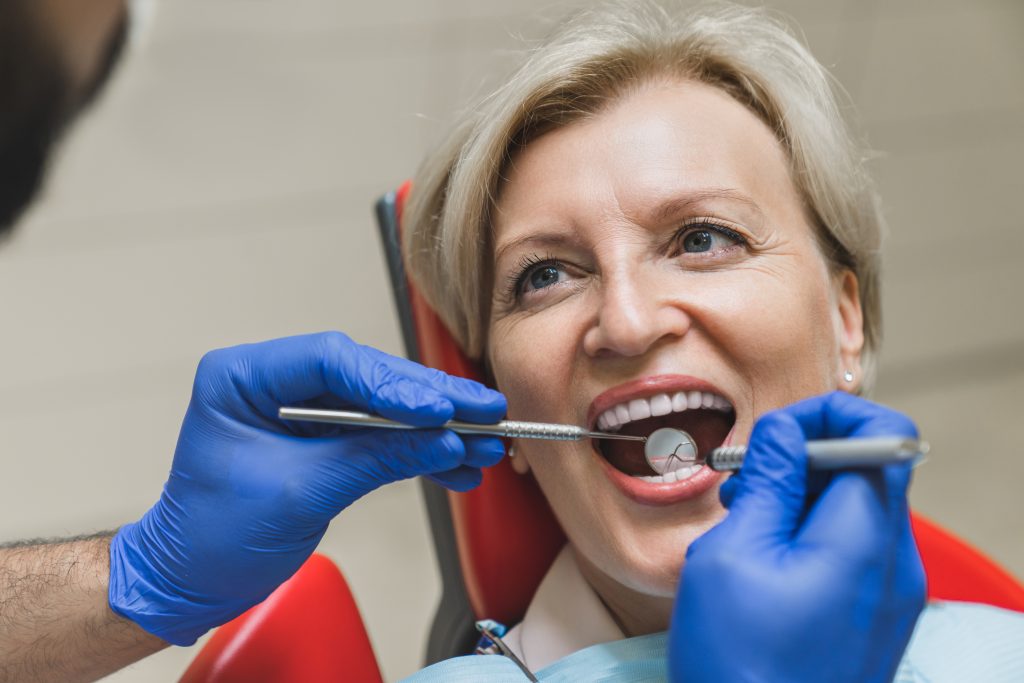
Can Other Procedures Be Done with Teeth Whitening?
Yes, teeth whitening is often planned together with other cosmetic dentistry procedures. For example, after the teeth have been lightened, the color of fillings, porcelain veneers, or crowns can be adjusted to match the new shade. This integrated approach is ideal for creating a more aesthetic and harmonious smile design. Your clinic will consider these options when creating the most suitable treatment plan for you.
How Long Do You Need to Stay in Antalya for Teeth Whitening?
The teeth whitening procedure in Antalya can usually be completed with a single clinic visit. However, staying for a few days is quite common for patients who want to experience the vacation concept (cure holiday). This period is sufficient for the whitening procedure and also allows you to enjoy the city. Most of the time, you can dedicate your afternoon to holiday activities after a morning procedure.
How are Travel and Accommodation Arrangements Made?
Many dental clinics in Antalya help foreign patients with travel and accommodation arrangements. Airport transfers, special accommodation prices at contracted hotels, and other logistical support to facilitate your treatment process can be offered. These services aim to make your treatment process more comfortable and planned. You can contact your clinic to get information about such “cure holiday” packages.
What is a “Cure Holiday” and Why is it Advantageous?
A “cure holiday” is a concept that combines a medical or cosmetic treatment with holiday activities. Getting teeth whitening in Antalya is one of the best examples of this concept. While receiving high-quality dental service at an affordable price, you can also explore the city’s historical and natural beauty and enjoy the sea, sand, and sun. This is an economical and pleasant way to invest in both your health and your soul.
What Should Be Done to Maintain Teeth Whitening Results?
To maintain the results of teeth whitening, it is very important to avoid staining foods and drinks (tea, coffee, red wine, cola, beets, etc.) for the first 24-48 hours after the procedure. This period is called the “white diet.” Afterwards, paying attention to your daily oral hygiene, regularly brushing your teeth, flossing, and reducing smoking will help the results last longer.
What to Pay Attention to Before Teeth Whitening?
Before teeth whitening, your dentist will perform a detailed examination. If there are problems such as decay, fractures, or gum disease in your teeth, these issues must be resolved first. The whitening procedure should only be applied to healthy teeth and gums. Also, since the color of your existing fillings and crowns will not be affected by the whitening procedure, these restorations may need to be replaced after whitening.
Can Zirconium or Porcelain Crowns Be Whitened with Teeth Whitening?
The teeth whitening procedure is only effective on natural teeth. Artificial restorations such as zirconium or porcelain are resistant to whitening gels and their color does not change. If the color of your existing crowns becomes incompatible with your natural teeth, they may need to be replaced after whitening to achieve a more aesthetic result. Therefore, if a comprehensive smile design is being planned, the whitening procedure is usually done as the first step.
Which Method Provides the Most Natural Result?
Both in-office and at-home teeth whitening methods can provide natural and aesthetic results. While in-office whitening offers a faster and more noticeable result, at-home whitening provides a slower and more gradual whiteness. In some cases, a combination of both methods is recommended to achieve the most ideal result. Your dentist will determine the most suitable method based on the initial shade of your teeth and your expectations.
What Materials are Used in Teeth Whitening?
In professional teeth whitening, the main active ingredients are usually gels containing hydrogen peroxide or carbamide peroxide. These gels penetrate the tooth enamel and oxidize and break down the color pigments that cause stains. Dentists adjust the gel concentration according to the patient’s tooth sensitivity and the desired result. It is important to ensure that your clinic uses high-quality and FDA-approved products.
Do Stains Reappear After Whitening?
Yes, stains can reappear over time after teeth whitening. This happens faster in people who smoke or frequently consume staining beverages such as tea, coffee, or red wine. However, with regular and good oral hygiene, the whitening effect can be maintained for a long time. In addition, periodic “touch-up” sessions performed by your dentist can help to refresh the whiteness.
How Does Smoking and Coffee Consumption Affect the Results?
Smoking and coffee are among the most important factors that negatively affect teeth whitening results. Tobacco and coffee cause rapid stain accumulation on the tooth enamel. Therefore, it is recommended to limit or completely quit these habits for the results to last longer after the whitening procedure. Adherence to the “white diet” after treatment is critically important, especially in the first 48 hours.
Can Whitening Be Done on People with Receding Gums?
Teeth whitening can be done on people with receding gums, but caution should be exercised. Gum recession can expose tooth roots and cause sensitivity in these areas. The dentist may take special precautions to minimize sensitivity or may not apply the whitening gel to the areas where there is gum recession. It is very important that the gums are healthy and there is no inflammation before the procedure.
Can Decayed Teeth Be Whitened?
No, decayed teeth cannot be whitened. Before the teeth whitening procedure, oral and dental health must be complete. Decay in teeth can cause the whitening gel to reach deeper layers of the tooth, leading to severe pain or infection. Therefore, your dentist will first treat your decay and then proceed with the whitening procedure. This is vital for both your health and the success of the procedure.
What is the Place of Whitening in Smile Design?
Smile design is a comprehensive treatment plan that includes multiple cosmetic dentistry procedures. Within this plan, teeth whitening is usually the first step. After the teeth are whitened, your dentist plans fillings, porcelain crowns, or other restorations to match this new color. This approach ensures that all procedures are in harmony and aesthetic unity with each other.
Are There Legal Regulations on Teeth Whitening?
Yes, there are legal regulations regarding teeth whitening in many countries. These regulations determine the concentration of whitening products and specify that they can only be applied under the supervision of a dentist. These rules aim to protect patient health and minimize potential risks. Knowing that reliable clinics in Antalya comply with these international standards and legal regulations is a source of assurance for patients.
What is the Ideal Age Range for Teeth Whitening?
The ideal age range for teeth whitening is generally 16 and over. In individuals under 16, the tooth development process is still ongoing, and the whitening procedure can negatively affect this process. Additionally, the nerves in the teeth are larger at this age, and the risk of sensitivity is higher. Your dentist will make the most accurate decision by looking at the person’s tooth development status and health history.
How to Eat After Teeth Whitening?
After the teeth whitening procedure, it is necessary to follow a diet plan called the “white diet” for the first 48 hours. This means avoiding foods and drinks that contain coloring pigments. Products such as coffee, tea, red wine, cola, beets, and cherry juice should be avoided. Instead, you should prefer colorless or light-colored foods such as water, milk, yogurt, rice, chicken, and bananas.
How to Maintain Oral Hygiene After Teeth Whitening?
Oral hygiene after teeth whitening is very important to maintain the whiteness of your teeth. You should regularly brush your teeth at least twice a day and use dental floss. In addition, using a fluoride mouthwash recommended by your dentist can help strengthen tooth enamel and reduce sensitivity. Regular professional dental cleanings also help to keep the whitening effect fresh.
